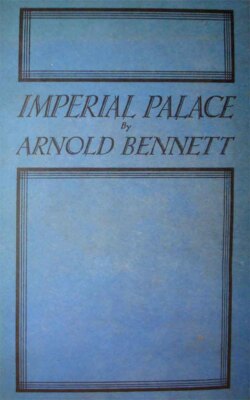Читать книгу Imperial Palace - Arnold Bennett - Страница 25
На сайте Литреса книга снята с продажи.
Chapter XII – DAUGHTER AND FATHER
ОглавлениеI
Gracie had no sooner entered her sitting-room at the Imperial Palace, leaving the door ajar as she left most doors ajar, than her father pushed open the door and peeped in. She was just dropping her leather coat on to a chair, which was already encumbered with a rug. Sir Henry inferred from the coat that his daughter had been out in the car. He wondered why, but asked no question. The relations between these two were peculiar, yet logical enough, considering their characters. Before he got his title his wife had divorced him, and obtained the custody of the child, then aged seventeen. She obtained also an alimony of five thousand a year. She had tried for ten thousand, and failed. Five thousand or ten thousand: the figure had no practical interest for Henry Savott, but he had fought her ruthlessly.
After three weeks of living with her mother, Gracie had walked into her father’s office one day, and said: “Daddy, I understand now.” “Understand what?” “You know.” Henry Savott had looked harshly at her and growled: “Better late than never.” Gracie had then announced that she had not the least intention of living any longer with her mother. “I’m not going to be in anybody’s ‘custody’! What a word!” Henry Savott had reminded her that she was a minor, and that the decree of the High Court of Justice explicitly put her in her mother’s power. Gracie, frequently a realist, had merely laughed. “I’d love to see the Court that could make me live with anybody I don’t want to live with. I’m coming to live with you, daddy.”
Henry Savott had been tremendously flattered. His daughter’s unsolicited testimonial was the finest gift ever bestowed upon him, and he instantly saw that it would do much to restore his damaged prestige in the social world. He offered objections to Gracie’s plan, but not convincingly. His maiden sister, who hated his wife, was induced to take theoretical charge over his household.
Gracie had enjoyed freedom from the very beginning of her new life; for her father was absorbed in his vast financial schemes, and her aunt, a hypochondriac with a magnificent constitution, was absorbed in the complex ritual of the treatment of her imagined diseases. As a rule hypochondriacs live for ever. But Miss Savott proved not to be immortal. She died suddenly, untimely, of a malady whose existence had concealed itself even from the hypochondriac’s ferreting morbidness. Attired in black on the evening of the funeral, father and daughter had had one of their short, clear, monosyllabic conversations, the result of which was that Gracie at twenty became the head of Sir Henry’s household. The unspoken but perfectly understood undertaking on Sir Henry’s part was: “Don’t make a fool of yourself, and I won’t make a fool of myself or of you. You leave me alone and I’ll leave you alone.” Twenty years earlier such an arrangement would have been regarded as immoral, but the Savotts were of those rather rare persons who look often at the calendar, not to know the day of the month, but to remind themselves of the Annus Domini. And the arrangement, being between two realists, worked. It suited both of them. Both possessed the faculty of not seeing what it might be inconvenient to see. Sir Henry in his old-fashioned way sometimes felt transient qualms; Gracie never.
Sir Henry had an immense admiration for his daughter, and especially for her worldly commonsense. He was proud of her racing achievements, which had cost him a lot of money in the building of monstrously engined cars. In every department of expenditure she was an extremely costly child. But he was free; she was free; she was a capable hostess; and domestic extravagance never disturbed him; for he had a sense of proportion. The miscarriage of a financial operation in the City might well in a day reduce his resources by more than Gracie could possibly squander in twenty years.
Such was their situation, and it explains why Sir Henry hid whatever curiosity he might have felt about the leather coat.
Two books lay on the floor of the littered, luxurious room. Sir Henry picked them up; for though he had learnt that his daughter’s enormous untidiness was incurable, his own instinct for order would out.
“The Bible and Shakspere,” he murmured. “Still?”
“The Bible and Shakspere still. And I don’t know which is best,” said Gracie.
“Why this surprising passion for the classics?” he twitted her.
“I only like them—that’s all,” said Gracie negligently. “I’m just reading the Psalms.”
“Why the Psalms?” he continued to twit the girl. “I should have thought the biography of David would be more in your line—as a contemporary young woman.”
“The Psalms are David’s biography,” Gracie replied.
He reflected:
“How does the kid think of these remarks of hers. Something in that. I never thought of it.” He was not an ardent reader.
“Oh!” he said.
“Yes. The finest thing in all the Bible is in the Psalms.”
“Oh!” he repeated, smiling. “What’s that? I’d like to hear.”
Gracie quoted with a certain solemnity:
“ ‘Be still, and know that I am God.’ Be still.”
Sombrely contemplative, she gazed at her parent, so dapper, so physically fresh in his age, so earthly, so active in his unending material schemes, so deaf and blind to the spiritual, so regardless of all that was incalculable by an adding machine. He fancied that her eyes were fixed upon his magnificent, regular, white teeth, which she had once called cruel, and instinctively he closed his lips on them, thus ceasing to smile.
“Shall I ever get to the bottom of this kid’s mind?” he asked himself, puzzled, uneasy, as it were intimidated; but still admiring. He dropped the books on to a table.
